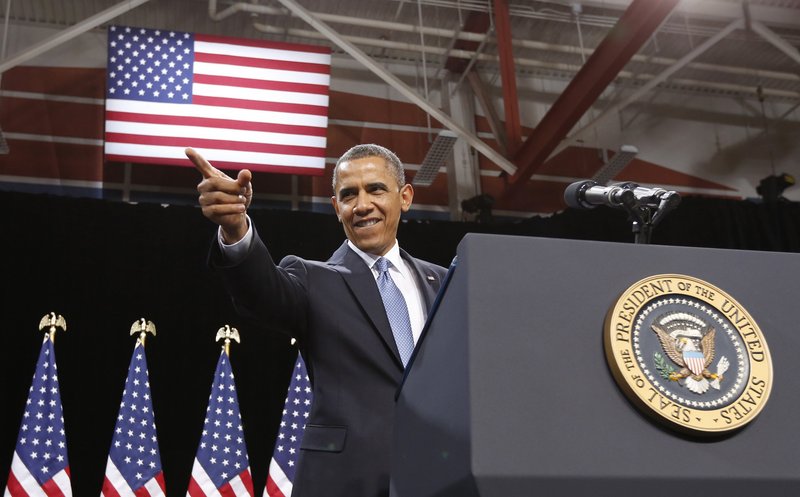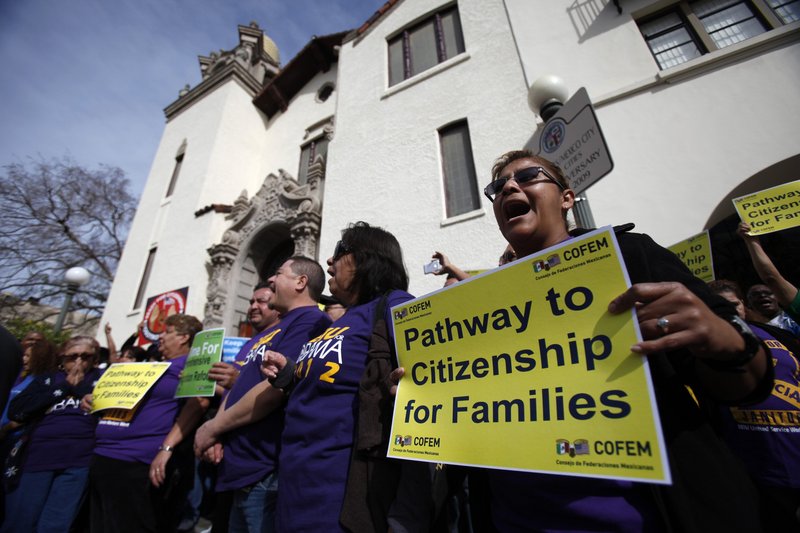LAS VEGAS – President Obama on Tuesday put the weight of his administration behind efforts to pass legislation allowing many of the nation’s 11 million illegal immigrants to earn citizenship, seeking to build on a rapidly shifting political consensus around the issue.
Obama dedicated the first trip of his second term to calling for an overhaul of immigration laws, making clear that it is one of his top domestic priorities. The president — who has said that not passing an overhaul in his first term was his biggest failure — also suggested he has little patience for Congress and would demand that lawmakers vote on his more permissive plan if they do not swiftly pass their own.
“Now is the time,” Obama said, eliciting chants of “Si, se puede” — roughly translated as “Yes, it’s possible” — from the crowd at a majority Hispanic high school here. “We can’t allow immigration reform to get bogged down in an endless debate.”
Fresh off a decisive re-election, Obama is seizing this moment as one in which both sides could come together to address widespread anxieties within rising demographic groups, particularly Hispanics and Asian Americans.
But obstacles still loomed large Tuesday on Capitol Hill, fueled by continued unease among conservative Republicans over going too far to loosen immigration restrictions. One of the biggest disputes centers on whether illegal immigrants would have to wait to seek a green card — the first step to full citizenship — until the U.S. border with Mexico is secure and other enforcement measures are in place.
A bipartisan Senate plan released Monday would tie the possibility of citizenship to several such enforcement measures, including a system to verify the immigration status of employees. The president did not comment explicitly on that proposal in his speech, but the administration suggested in its own guidelines released Tuesday that it does not want to link the citizenship process to other goals.
“It must be clear from the outset that there is a pathway to citizenship,” Obama said, adding that the administration has made great strides in an effort to toughen enforcement.
Some key Republicans expressed concern with any approach that does not link border security with the proposal to offer illegal immigrants a way to become citizens.
“Without such triggers in place, enforcement systems will never be implemented and we will be back in just a few years dealing with millions of new undocumented people in our country,” said Sen. Marco Rubio, R-Fla., a potential 2016 presidential candidate and one of eight senators who signed on to the bipartisan framework.
Another set of pitfalls awaits in the House, where many Republicans are deeply skeptical of any legislation that they believe might be overly generous to illegal immigrants.
“There are a lot of ideas about how best to fix our broken immigration system,” said Brendan Buck, a spokesman for House Speaker John Boehner, R-Ohio. “We hope the president is careful not to drag the debate to the left and ultimately disrupt the difficult work that is ahead in the House and Senate.”
The White House had considered releasing its own legislation to overhaul the immigration system, but Obama said he would not immediately do so.
The president and his aides have long worried that by simply endorsing a position, Obama could turn Republicans against a proposal they otherwise might support.
Obama said the Senate framework is “very much in line with the principles I’ve proposed and campaigned on for the last few years.” But — in keeping with the more muscular approach he has taken in other recent debates — Obama also made clear he would not wait long.
“If Congress is unable to move forward in a timely fashion, I will send up a bill based on my proposal and insist that they vote on it right away,” he said.
Just a year ago, during a Republican presidential primary season dominated by tough talk on immigration, it seemed implausible that legislation to address the issue could muster support.
But many Republicans have shifted rapidly on the issue since the November election, when Obama won more than 70 percent of votes from Latinos and Asian Americans.
Sen. John McCain, R-Ariz., Obama’s 2008 opponent, said he was “cautiously optimistic” that the two sides could reach a deal.
“While there are some differences in our approaches to this issue, we share the belief that any reform must recognize America as a nation of laws and a nation of immigrants,” said McCain, who spearheaded a failed 2007 immigration overhaul effort before emphasizing tough border positions during his 2010 re-election.
The senators have said they want to draft a bill by the end of March and pass it through the Senate by the summer, striking quickly while there is momentum on the issue.
But aides acknowledge there are dozens of questions they must answer before they can come forward with legislation.
For example, what measurements will be used to determine if border security has been improved sufficiently to allow illegal immigrants to pursue full citizenship? How would a temporary-worker program operate?
Under Obama’s plan, illegal immigrants seeking citizenship would register, submit biometric data, pass background checks and pay fees before gaining provisional legal status, according to a White House summary.
After taking those steps and learning English, the immigrants would wait their turn for existing immigration backlogs to clear before being allowed to apply for permanent resident status, which immigrants must hold before they can apply for citizenship.
Children brought to the United States illegally would be eligible for an expedited process if they go to college or serve in the military for at least two years.
The plan would also allow citizens and permanent residents to seek a visa for a same-sex partner — an idea opposed by many religious groups and one that went unmentioned by Obama in his Tuesday speech.
“It won’t be a quick process, but it will be a fair process,” Obama said Tuesday in Nevada, which is 27 percent Hispanic.
The president, the son of a Kenyan man and an American woman, also sought to remind the audience of immigration’s central role in the nation’s history.
“When we talk about that in the abstract, it’s easy sometimes for the discussion to take on a feeling of ‘us versus them,’ ” Obama said. “And when that happens, a lot of folks forget that most of ‘us’ used to be ‘them.’ “
Send questions/comments to the editors.




Success. Please wait for the page to reload. If the page does not reload within 5 seconds, please refresh the page.
Enter your email and password to access comments.
Hi, to comment on stories you must . This profile is in addition to your subscription and website login.
Already have a commenting profile? .
Invalid username/password.
Please check your email to confirm and complete your registration.
Only subscribers are eligible to post comments. Please subscribe or login first for digital access. Here’s why.
Use the form below to reset your password. When you've submitted your account email, we will send an email with a reset code.